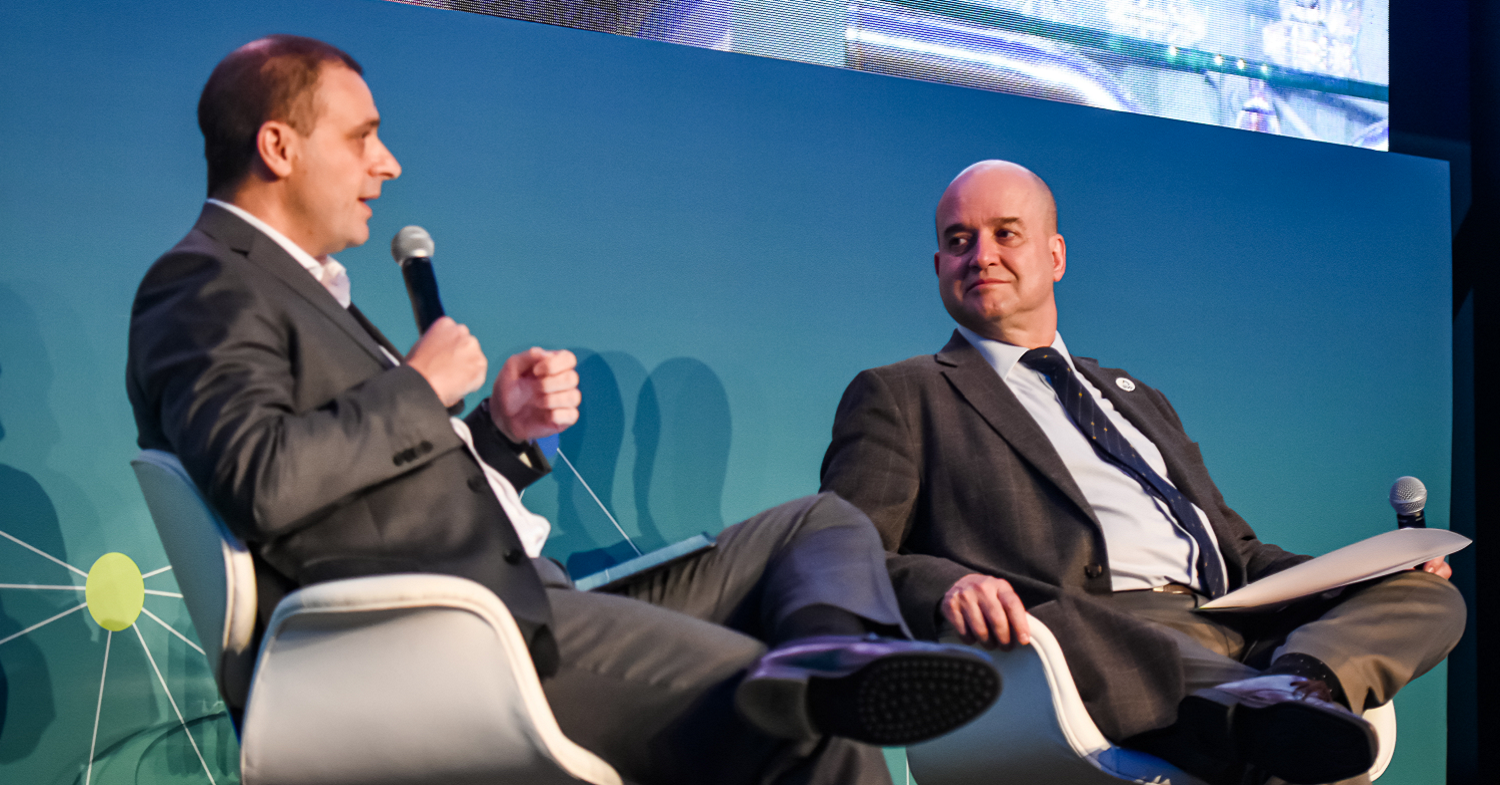Energy security and decarbonization are the highlights of the second day of OTC Brazil

The need to increase energy supply combined with the long-term vision of a low-carbon economy set the tone for the debates
The oil and gas sector is key to economic growth, energy security and the energy transition. In this context, the decarbonization of the sector was the highlight during the second day of OTC Brazil. In a debate with IBP president Roberto Ardenghy, Alberto Ferrin, president of ExxonMobil in Brazil, highlighted the company’s long-term vision of the global energy market.
According to Ferrin, the outlook is for renewable energies to play a greater role, but oil and gas exploration and production activities will still play a crucial role in society.
“By 2050, there will be 2 billion more people on the planet. That’s an increase of 25%, as well as an improvement in living standards. For ExxonMobil, this will drive consumption of all types of energy,” said the executive.
Petrobras reduces emissions by 30% with electrified equipment
Carlos Travassos, director of engineering, technology, and innovation at Petrobras, said that decarbonization and the energy transition will be led globally by the O&G segment. Electrification is a trend that Petrobras is working on in the short term. “We have already reduced 30% of our emissions with electrified equipment,” he revealed.
In the renewable energy segment, Travassos pointed to Petrobras’ interest in offshore wind technology. The executive emphasized that the company has the know-how to lead this market. “We are studying how we can operate in the offshore wind segment in the long term. We have the expertise to support Brazil in this field of renewable energy generation,” he concluded.
Existing technologies support decarbonization
In the current production chain in the energy sector, around 70% of the equipment is already planned and operating with a focus on global decarbonization. This is the assessment of Armando Juliani, EAD Solutions Leader at Siemens Energy. “Electrification is a way of reducing emissions in some industries, such as the automotive one”. Providing a future perspective, Joao Caldas (Head of Analytics, New Technologies and Innovation at Casa dos Ventos) estimated that, by 2050, we will be talking about 100% solar and wind generation. “In the last decade, we’ve seen a 90% increase in renewables on the grid,” he said.
The pre-salt is safe for carbon storage
There are several mechanisms for carbon capture and storage (CCUS) in the pre-salt reservoirs, which can be managed safely according to Jorge Pizarro, PPSA’s reservoir control coordinator. “We have great prospects for CCUS programs for the pre-salt in the next 20 – 30 years. We will see advances in offshore technology and economic studies to make the projects viable,” says Pizarro. Today, Petrobras has the world’s largest CCUS project in the pre-salt, with 23 platforms equipped with storage systems. More than 40 million tons of CO2 were reinjected into the reservoirs by 2023 and the goal is to reach 80 million by 2025.
Energy integration
The challenges of energy integration in Brazil were also addressed on the second day of OTC Brazil. Márcio Félix, CEO of EnP, emphasized that there is a lot of work to be done to promote better integration between different energy sources. “We will have the option of electric cars and we have thousands of refueling stations, along with a strong biofuels segment. We need to balance existing and new infrastructure,” he said.
The importance of the Mero field
Operated by Petrobras and their partners, the Mero field, in the pre-salt Santos Basin, is now considered “state of the art” in the global oil and gas industry. On the eve of its 10th anniversary, celebrated at OTC 2023, FPSO Guanabara, the largest in operation in the country, reached a production record of 180,000 barrels of oil and 12 million m³ of gas per day. And with the entry into production of FPSO Sepetiba, in the Mero field, production capacity will increase to 630,000 barrels per day.
By 2025, the field will have five integrated subsea systems and will be operating with new technologies to maximize its capacity, such as 4D artificial intelligence for surveying seismic data. Other innovations in the project include the adoption of the Wag loop and a fully integrated subsea well system.
Spotlight on New Technology® Awards
By the end of the second day of OTC Brazil, awards were granted to the leading cases of recent technologies considered to be the most advanced to guide the offshore industry in the coming years.
The winners of the Spotlight on New Technology® Awards are:
– Bosch Rexroth, producer of Lean All-Electric Subsea Valve Actuation
– DeltaTek – an Expro Company, producer of QuikCure®.
– Expro, producer – Expro HotDAS, ExDTS and QikView DFOS Data Processing and Visualization Software
– Expro, producer of Centri-FI™ Consolidated Control Console
OTC Brasil runs until Thursday in Rio de Janeiro. The 2023 edition has master sponsorship from Petrobras; platinum sponsorship from Shell and TotalEnergies; gold sponsorship from Ambipar, bp, Chevron, Equinor, ExxonMobil, Prio and RepsolSinopec Brasil; silver sponsorship from Enauta, Porto do Açu and TechnipFMC; bronze sponsorship from Corio Generation, Perbras, SBM Offshore, Tenaris, Tivit, Quorum Software and OceanPact; Decarbonization & Technology Arena sponsorship from Radix, ASME, TESS, GE, Huisman, Innovation Norway, PPSA, Bratecc, Shape and Wams; support as official airline operator from United Airlines; official carbon offset partnership from AMBIFY; ApexBrasil as the International Business partner; Blumar as the official tourism agency; B&T as the official foreign exchange broker; and partners such as Abimaq, Brazil-Texas Chamber of Commerce, RedePetro ES, SPE UNIFEI and Norwegian Energy Partners. The event also has the support of the Federal Government.
Service: OTC Brazil 2023
Date: October 24 to 26, 2023
Venue: ExpoMag, Rio de Janeiro
Information on the last available tickets here.